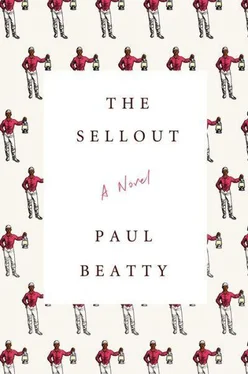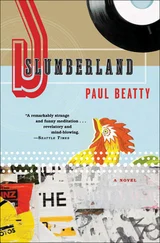“See that abandoned bus station next to the cotton gin?”
I sprinted down the road. Although the building was no longer operational, balls of cottonseed still blew in the wind like itchy snowflakes. I made my way to the back, past the gin, the empty pallets, a rusted forklift, and the ghost of Eli Whitney. The filthy one-toilet bathroom buzzed with flies. The floors and the seat were flypaper sticky. Glazed to a dull matte yellow by four generations of good ol’ boys with bottomless bladders, pissing countless gallons of drunk-on-the-job clear urine. The acrid stink of unflushed racism and shit shriveled my face and put goosebumps on my arms. Slowly I backed out. Underneath the faded WHITES ONLY stenciled on the grimy lavatory door, I ran my finger through the grit and wrote THANK GOD, then peed on an anthill. Because apparently the rest of the planet was “Colored Only.”
At first glance the Dons, the hilly neighborhood about ten miles north of Dickens that Marpessa moved to after she married MC Panache, looks like any well-to-do African-American enclave. The tree-lined streets are twisting. The houses are fronted with immaculate Japanese-style gardens. The wind chimes somehow coerce the air currents into Stevie Wonder songs. American flags and campaign signs supporting crooked politicians are displayed proudly in the front yard. When we were dating, sometimes after a night out, me and Marpessa would cruise the neighborhood, wheeling Daddy’s pickup truck through streets with Spanish names like Don Lugo, Don Marino, and Don Felipe. We used to refer to the modern but smallish homes with their pools, plate-glass windows, stone facades, and weatherproofed balconies overlooking downtown Los Angeles as “Brady Bunch houses.” As in “The motherfucking Wilcoxes came up, dude. Them niggers kicking it in a Brady Bunch house off Don Quixote.” We hoped one day to live in one of these homes and have a barrel of children. The worst thing that could happen to us was that we’d falsely accuse our oldest son of smoking, a poorly thrown football would break our daughter’s nose, and our slightly slutty maid would constantly throw herself at the mailman. Then we’d die and go into worldwide syndication like all good American families.
For ten years, ever since our breakup, I’d periodically park outside her crib, wait until the lights went out, then through the binoculars and a sliver of open bay window curtain, I’d take in the life I should’ve been living, a life of sushi and Scrabble, kids studying in the living room and playing with the dog. After the children went to bed, I’d watch Nosferatu and Metropolis with her, crying like a baby because the way Paulette Goddard and Charlie Chaplin in Modern Times circle around each like two dogs in heat reminded me of us. Sometimes I’d sneak up to the porch and, in the screen door, leave a snapshot of the growing satsuma tree on her porch with Our son, Kazuo, says hello written on the back.
There isn’t much you can do about segregating a school when school isn’t in session, and that summer I spent more time outside her house than for legal reasons I care to admit, until one warm August night, the forty-foot Metro bus parked in Marpessa’s driveway forced me to abort my stalker protocol. Like their white-collar comrades, it’s not unusual for black blue-collar employees like Marpessa to take their work home with them. Regardless of your income level, the old adage of having to be twice as good as the white man, half as good as the Chinese guy, and four times as good as the last Negro the supervisor hired before you still holds true. Nevertheless, I was surprised as hell to see the #125 bus sitting in her driveway, its back end blocking the sidewalk, its right-side tires ruining a once-perfect lawn.
Tree photo in hand, I crept past the gardenias and the Westec security sign. Rising to my tippy-toes, I peered into a side window, cupping my hands around my eyes. Even in the cool of the midnight air, the vehicle was still warm and thick with the scent of gasoline and the sweat of the working class. It’d been four months since Hominy’s birthday party and the PRIORITY SEATING FOR SENIORS, DISABLED, AND WHITES signs were still up. I wondered aloud how she got away with them.
“She says it’s an art project, nigger.”
The barrel of the snub-nosed.38 boring into my cheekbone was cold and impersonal, but the voice behind the gun was the exact opposite, warm and friendly. Familiar. “Dude, if I hadn’t recognized the smell of cow shit on your ass, you’d be dead as good black music.”
Stevie Dawson, Marpessa’s younger brother, spun me around and, gun in hand, gave me a bear hug. Behind him stood a red-eyed Cuz, a tipsy grin happily cutting across his mug. His boy Stevie was out of jail. I was glad to see him, too; it’d been at least ten years. Stevie’s rep was even more dastardly than Cuz’s. Gang-unaffiliated only because he was too crazy for the Crip sets and too mean for the Bloods. Stevie hates nicknames, because he feels real bad motherfuckers don’t need one. And although there are a few hardheads around the way who answer to their Christian names, when niggers say Stevie, it’s like a Chinese homophone. If you’ve been around, you know exactly who they mean. In California you get three strikes. If you’re convicted of two felonies, the next guilty verdict, no matter how minor, can mean life in prison. Somewhere along the line the catcher must have dropped Stevie’s third strike, because the system had sent him back to the plate.
“How did you get out?”
“Panache sprung him,” Cuz answered, offering me a sip of Tanqueray that was almost as nasty as its diet grapefruit soda chaser.
“What, he performed one of his shitty benefit concerts and snuck you out in a speaker?”
“Power of the pen. Between his TV cop gig and the beer commercials, Panache knows some big-time white people. Letters were written, and here I am. Conditionally paroled like a motherfucker.”
“What conditions?”
“The condition that I don’t get caught. What else?”
One of the dogs began to bark. The kitchen curtains parted, spilling light onto the driveway. I flinched, even though we were out of sight.
“No need to be scared. Panache ain’t here.”
“I know. He’s never here.”
“And how you know that, you been stalking my sister again?”
“Who’s out there?” It was Marpessa, saving me from further embarrassment. I mouthed to Stevie that I wasn’t there.
“It’s just me and Cuz.”
“Well, bring your asses inside before something happens.”
“All right, we’ll be in in a second.”
The first time I met Stevie, back when he and his sister lived in Dickens, there was a limousine parked in front of their house. Except for prom night, you don’t see many limos in the ghetto. And that black stretch Cadillac — crammed from mini bar to back window with roughnecks, light and dark, tall and short, smart and stupid — held Stevie’s boys. Boys who over the years disappeared in ones and twos and, on really bloody days — threes. Bank robberies. Food truck holdups. Assassinations. Panache and King Cuz were the only homies he had left. And though Stevie and Panache really liked each other, it was a relationship that profited both parties. Panache wasn’t no punk, but Stevie gave him real street cred in the rap scene, and for Stevie, Panache’s success reminded him that all things are possible if one can get the right white people on your side. Back then Panache fancied himself a pimp. Sure, he had women doing shit for him, but what nigger didn’t? I remember Panache in the living room staring Marpessa down, rapping what would become his first gold record, while Stevie DJ’d for him.
Читать дальше












